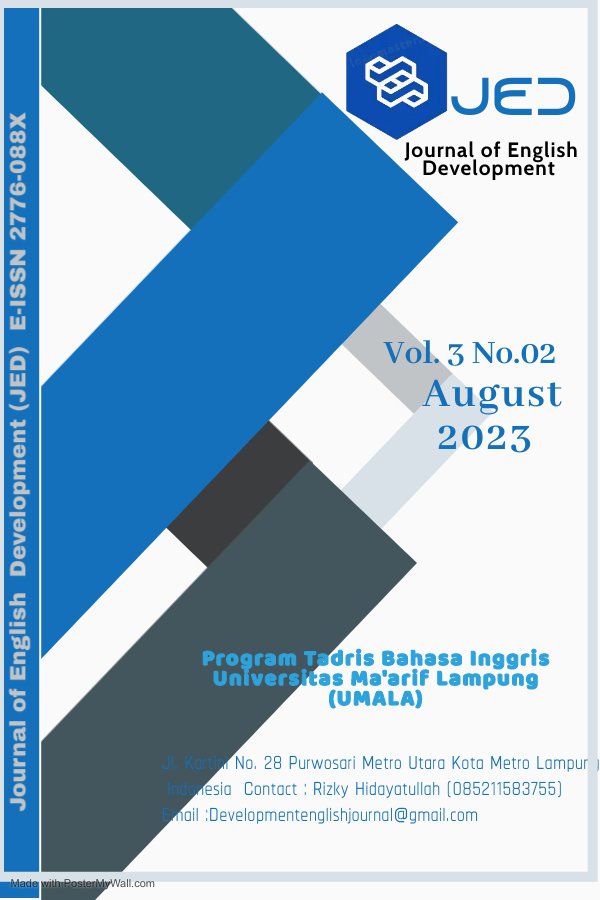The Investigating CTS connection: Input and output ability in debate for L2 learners
English
DOI:
https://doi.org/10.25217/jed.v3i02.3155Keywords:
English debate, input ability, critical thinking skillAbstract
This qualitative research investigates the critical thinking skill ability on language input ability. However, past researchers failed to identify this and focused on the output and emotional factors, even the background knowledge of the samples is mentioned as a problem. The method used in this research is a Systematic Literature Review. This study investigates the connection between critical thinking and input ability skills within the debate framework. In debate, the spontaneous and responsive ability intrigues the researcher in case of debate. Nevertheless, the forgotten essential in the debate is the input ability, for example, confirming information, summarizing, catching details, listening to the arguments, processing the flaw, and other necessary skills in debate before the output ability. The sources for this literature review are from the past thirty journals before in the past ten years. The data is collected on the internet with the help of Google Scholar and reviewed by summarizing the journals and taking a conclusion with the result revealed. The result of this paper shows that emotional intelligence, output and input ability concern, speaking proficiency and CTS thorough debate framework are related. This means that input ability plays a major key in output production The excitement for the next research is to find a method to equalize the improvement of input abilities rather than focusing on output ability.
References
AAclan, E. M., & Aziz, N. H. A. (2015). Exploring parliamentary debate as a pedagogical tool to develop English communication skills in EFL/ESL classrooms. International Journal of Applied Linguistics and English Literature, 4(2), 1–16.
Dewi, Y. P. (2023). Improving Students’ Speaking Ability in Expressing Opinion through Think Pair Share: English. Journal of English Development, 3(01), 29–37.
Duriau, V. J., Reger, R. K., & Pfarrer, M. D. (2007). A content analysis of the content analysis literature in organization studies: Research themes, data sources, and methodological refinements. Organizational Research Methods, 10(1), 5–34.
Elder, L., & Paul, R. (2020). Critical thinking: Learn the tools the best thinkers use. Foundation for Critical Thinking.
Fadilah, L., & Wijaya, A. (2022). PAI Teacher’s Strategy In Developing Student’s Emotional Intelligence. Journal of Contemporary Islamic Education, 2(1), 29–47.
Flege, J. E. (2018). It’s input that matters most, not age. Bilingualism: Language and Cognition, 21(5), 919–920.
Freeley, A. J., & Steinberg, D. L. (2013). Argumentation and debate, critical thinking for reasoned decision making . Wadsworth Cengage Learning.
Johnson, E. B. (2002). Contextual teaching and learning: What it is and why it’s here to stay. Corwin Press.
Maharia, A. C. (2020). Developing Speaking Skill Through Debating: Undergraduate EFL Students’ Perception. 2nd Educational Sciences International Conference (ESIC 2019), 22–26.
Muchsonny, M., Rahman, F., & Hidayatullah, R. (2021). THE STUDY OF BILINGUAL MILIEU TOWARD THE STUDENT’S SPEAKING PERFORMANCE AT MODERN BOARDING SCHOOL. Journal of English Development. https://doi.org/10.25217/jed.v1i01.1431
Saputri, M. R. A., Indah, R. N., & Rasyid, F. (2022). DEBATE, CRITICAL THINKING DISPOSITION, AND SELF CONFIDENCE: DO THEY CONTRIBUTE TO SPEAKING PROFICIENCY? Premise: Journal of English Education and Applied Linguistics, 11(1), 189–207.
Sari, D. M. M., & Prasetyo, Y. (2021). Project-based-learning on critical reading course to enhance critical thinking skills. Studies in English Language and Education, 8(2), 442–456.
Syukri, A. M. (2016). Measuring the ability in debate dealing with fluency and accuracy of the third semester students of English Education Department. ETERNAL (English, Teaching, Learning, and Research Journal), 2(1), 1–13.
Zare, P., & Othman, M. (2015). Students’ perceptions toward using classroom debate to develop critical thinking and oral communication ability. Asian Social Science, 11(9), 158.
Aclan, E. M., & Aziz, N. H. A. (2015). Exploring parliamentary debate as a pedagogical tool to develop English communication skills in EFL/ESL classrooms. International Journal of Applied Linguistics and English Literature, 4(2), 1–16.
Dewi, Y. P. (2023). Improving Students’ Speaking Ability in Expressing Opinion through Think Pair Share: English. Journal of English Development, 3(01), 29–37.
Duriau, V. J., Reger, R. K., & Pfarrer, M. D. (2007). A content analysis of the content analysis literature in organization studies: Research themes, data sources, and methodological refinements. Organizational Research Methods, 10(1), 5–34.
Elder, L., & Paul, R. (2020). Critical thinking: Learn the tools the best thinkers use. Foundation for Critical Thinking.
Fadilah, L., & Wijaya, A. (2022). PAI Teacher’s Strategy In Developing Student’s Emotional Intelligence. Journal of Contemporary Islamic Education, 2(1), 29–47.
Flege, J. E. (2018). It’s input that matters most, not age. Bilingualism: Language and Cognition, 21(5), 919–920.
Freeley, A. J., & Steinberg, D. L. (2013). Argumentation and debate, critical thinking for reasoned decision making . Wadsworth Cengage Learning.
Johnson, E. B. (2002). Contextual teaching and learning: What it is and why it’s here to stay. Corwin Press.
Maharia, A. C. (2020). Developing Speaking Skill Through Debating: Undergraduate EFL Students’ Perception. 2nd Educational Sciences International Conference (ESIC 2019), 22–26.
Muchsonny, M., Rahman, F., & Hidayatullah, R. (2021). THE STUDY OF BILINGUAL MILIEU TOWARD THE STUDENT’S SPEAKING PERFORMANCE AT MODERN BOARDING SCHOOL. Journal of English Development. https://doi.org/10.25217/jed.v1i01.1431
Saputri, M. R. A., Indah, R. N., & Rasyid, F. (2022). DEBATE, CRITICAL THINKING DISPOSITION, AND SELF CONFIDENCE: DO THEY CONTRIBUTE TO SPEAKING PROFICIENCY? Premise: Journal of English Education and Applied Linguistics, 11(1), 189–207.
Sari, D. M. M., & Prasetyo, Y. (2021). Project-based-learning on critical reading course to enhance critical thinking skills. Studies in English Language and Education, 8(2), 442–456.
Syukri, A. M. (2016). Measuring the ability in debate dealing with fluency and accuracy of the third semester students of English Education Department. ETERNAL (English, Teaching, Learning, and Research Journal), 2(1), 1–13.
Zare, P., & Othman, M. (2015). Students’ perceptions toward using classroom debate to develop critical thinking and oral communication ability. Asian Social Science, 11(9), 158.

Downloads
Published
How to Cite
Issue
Section
License
Copyright (c) 2023 Yahya Al Abrar, Nasrullah Nasrullah

This work is licensed under a Creative Commons Attribution-ShareAlike 4.0 International License.





